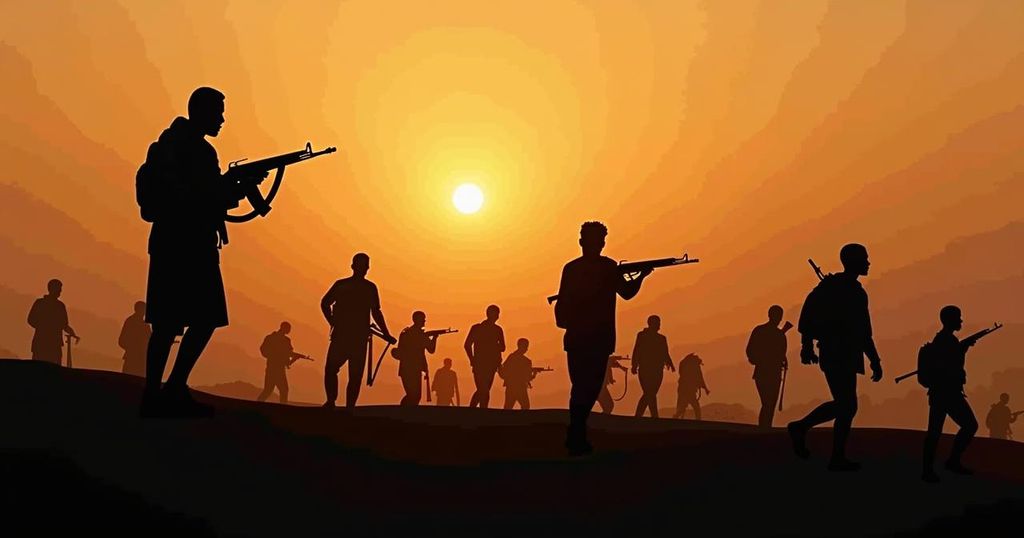Yemen’s Houthi rebels are becoming increasingly significant players in Middle Eastern conflicts, launching attacks against Israel amid ongoing tensions. The rebels, supported by Iran, have stepped up military operations targeting shipping in the Red Sea, leveraging widespread solidarity with Palestinians to bolster recruitment. Analysts indicate that the Houthis could gain military advantages and heightened influence in the region, making them key actors that cannot be ignored in future diplomatic negotiations regarding Yemen’s civil war.
In recent days, following Israel’s intensified military actions against Hezbollah in Lebanon, the Houthi rebels of Yemen have re-emerged as a significant force within the intricate conflicts destabilizing the Middle East. Notably, they executed a bold attack by launching a ballistic missile at Israel’s primary airport when Prime Minister Benjamin Netanyahu returned from his speech at the United Nations in New York. Subsequently, the Houthis issued threats of “escalating military operations” aimed at Israel after reportedly downing a U.S. military drone operating over Yemen. Their aggressive tactics continued with drone strikes against commercial vessels in the Red Sea, contributing to their heightened visibility and raising critical inquiries regarding their objectives and strategies in the regional conflict. The Houthis, backed by Iran, gained control of Yemen’s northern regions and its capital, Sanaa, approximately a decade ago, leading to the exile of the country’s internationally recognized government. Since the advent of the Saudi-led coalition’s intervention in 2015, Yemen has endured a civil war characterized by stalemate and devastation. The parallel outbreak of hostilities in Gaza, sparked by Hamas’s attack on Israel, has galvanized the Houthis, prompting them to initiate assaults on maritime traffic in the Red Sea corridor—a strategic maneuver they assert is aimed at pressuring Israel and its allies over the ongoing conflict in Gaza. Analysts posit that an expansive conflict could amplify the militaristic capabilities of the Houthis and enhance their influence across the Middle East, notwithstanding retaliatory actions from Israel, the United States, and the United Kingdom. Ahmed Nagi, a senior Yemen analyst at the Crisis Group, notes that the Houthis, once relegated as a peripheral actor, have escalated their operations to become a central player in the unfolding geopolitical landscape. The connection between the Houthis and the Palestinians is underscored by a shared anti-Israel stance, which the Houthis leverage to attract new recruits. In June, they unveiled a solid-fuel missile named after Palestine and launched it towards Israel, demonstrating their increasingly sophisticated military capabilities. The ongoing violence in Gaza has significantly influenced public sentiment across the region, allowing the Houthis to tap into prevailing sentiments of solidarity with the Palestinian cause while simultaneously enhancing their recruitment initiatives. Many observers are taken aback by the extent of the Houthis’ assertive military strategies given their limited resources amidst Yemen’s crisis. Nagi describes their approach as one of “gradual escalation” towards Israel, suggesting a future aspiration to acquire more advanced weaponry. Their campaign has seen an expansion of targets, originally focused on vessels with alleged ties to Israel, now extending to all commerce traversing the vital Red Sea and Gulf of Aden routes—actions that have prompted significant international military responses. The Houthis’ control over northern Yemen is bolstered by substantial domestic support, despite the harsh economic conditions and suppression of dissent. Public support for the Palestinian cause significantly aids the Houthis in consolidating their power, with vibrant demonstrations in Sanaa highlighting a widespread commitment to Palestinian solidarity. This burgeoning prominence may afford the Houthis leverage in any prospective negotiations regarding Yemen’s civil conflict. As noted by Faozi al-Goidi, such developments could lead to an imperative shift in how the Houthis are perceived in the broader geopolitical discourse, as they have effectively raised “their ceiling for negotiations.”
The ongoing conflict in Yemen, primarily between the Houthi rebels and the Saudi-backed government, has drawn comment and concern from multiple global actors, especially given its connections to larger geopolitical tensions across the Middle East. The Houthis, who have sustained control over northern Yemen for nearly a decade, are increasingly active in regional conflicts, especially in response to the Israel-Hamas war. Their actions underscore a growing partnership with Iran while also hinting at their aspirations to establish broader influence through collaboration with other militias and potential alliances. As the situation evolves, the Houthis are strategically positioning themselves to underscore their importance in the regional power dynamics.
In summary, the Houthis have strategically capitalized on the broader conflicts in the Middle East, particularly the war in Gaza, to assert their role as a formidable regional player capable of influencing maritime security and engaging in military operations against Israel. Their ongoing actions—spurred by public sentiments in support of the Palestinian cause—have the potential to reshape the geopolitical landscape, enhancing their military capabilities and expanding their influence. As such, the Houthis are poised to negotiate from a position of increased prominence, ensuring that their demands and objectives cannot be overlooked in any discussions surrounding the resolution of the Yemen conflict.
Original Source: apnews.com







